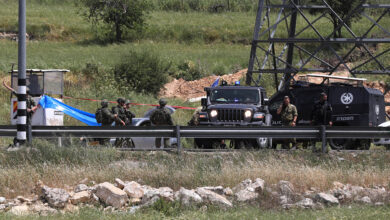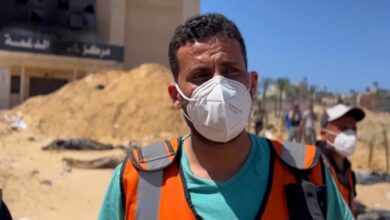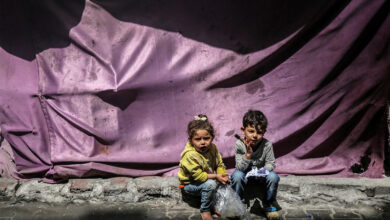Living in a territory under siege could be a perfect excuse for lazy students to avoid challenging work. The students at Khan Younis Training College (KYTC), however, have chosen to pursue a highly ambitious project by anyone’s standards: designing and building a fully-functional racecar.
This challenge came in the form of the automechanics class’s graduation project, and, while they undoubtedly hope for a passing grade, for many of them, the real test is the Student Formula – a highly-regarded international competition sponsored by the UK’s Institution of Mechanical Engineers (IMechE).
“This challenge was important for many reasons,” says Mohamed al-Agha, a senior instructor at KYTC, and the formula team’s financial supervisor. “First and foremost, as a way to counter the students’ own inferiority complex, we wanted to them see, and believe, that they were just as competent as European and American students, despite the restrictive reality of our situation.”
For Agha and other instructors at the KYTC, this was no simple task. In fact, he claims that KYTC’s automechanics department – one of four majors available at the technical and vocational college – was initially created by Ghassan Abou Ouf, the dean of the college, as a way to “prove to our students what we were all capable of – us and them.”
“This was all Dr. Ghassan’s idea,” says Agha. “He wanted to motivate the students, and he has. They would be the first to admit that they never expected they would build a functioning racecar, but they have, against all odds.”
“This process was all about challenges,” Agha explains. “We are challenging stereotypes, we are proving to people that Arabs, and more specifically, Palestinian refugees living under siege can still accomplish something like this. We are celebrating the spirit of challenge.”
“We have already impressed the IMechE with what we’ve achieved,” says Agha. “We don’t want the world’s sympathy. We just want to show them what we can do.”
So far, Agha believes that things have been going increasingly well for the department, to the extent that the students’ car – completed at an estimated cost of US$30,000 and after several months of false starts and setbacks – has been accepted by the ImechE into the Student Formula. The students and their supervisors are understandably proud of their accomplishment given the inherent difficulty in securing the needed supplies in a land that has been under siege since 2007.
“Our first major issue was the engine,” Agha recalls. “We simply couldn’t find one that met the formula’s requirements, so we ended up taking one from a motorcycle.”
While some essential parts were difficult to obtain, others were similarly difficult to keep. “We had ordered several parts from Italy,” Agha says. “After they arrived, Israeli authorities decided to confiscate them” without an explanation from Israeli authorities. The parts were soon shipped back to Italy.
Frustrated and powerless, the team fell back on their contingency plan, which Agha sums up with an old cliché – “necessity is the mother of invention.”
The team turned to recycled material, searching through, and collecting all sorts of scrap metal, which they felt might be useful in the construction of their car. “They [the students] also got together and formed workshops in order to design specific parts that were otherwise unavailable,” says Agha.
The problems did not end with the completion of the car; there still remained the issue of securing the considerable funding required to send a 16-member team, not to mention their racecar, from the Gaza strip to the UK. And when that problem was eventually resolved by sponsors, the team found themselves facing the disappointment of having their visa applications initially denied by the British Embassy in Amman, Jordan. After that complication was surpassed, and visas eventually issued, the team lost a member at the Rafah border between the Gaza strip and Egypt.
“Egyptian authorities sent one of our team members back to Gaza,” Agha told Al-Masry Al-Youm by phone from the UK. “They said it was for security reasons, and they forced him to return. But they were very polite about it.”
Today, the team-members are in the UK, preparing for the formula, which is set to start on 14 July and last for three days. If Agha feels like the worst is over, it is an optimism heavily tinged with caution. “We’ll see how things go from here,” he says. “Everything will be alright, God willing.”
Regardless of how it places, the team’s car will be put on permanent display at the KYTC upon its return to Gaza, and students of the UNRWA-run center will continue to enter future competitions for as long as they can. “The plan is to participate every two years,” says Agha. “Hopefully, that will encourage other Palestinian teams to step forward.”
“We can be creative, we can think big,” he insists. “This is what we have always claimed, and believed. Now, it’s time for us to prove it to ourselves, and the international community.”




